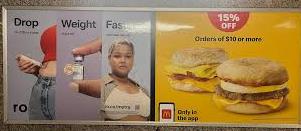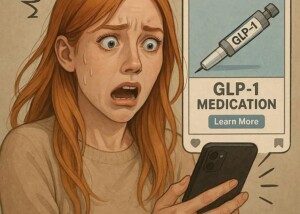It’s okay to think it’s bizarre that a woman who’s always been slender gets triggered by GLP-1 ads popping up.
This individual likely becomes distressed upon seeing TV ads for any kind of weight loss program – be it GLP-1’s such as Wegovy and Mounjaro, or ads ranging from Nutrisystem to Sono Bello.
I wonder if she gets ill-at-ease when ads for McDonald’s, Arby’s and Pizza Hut come on — as such ads are pretty good at fueling binge eating disorder and contributing to obesity.
I grew up seeing ads on TV for weight loss. Who didn’t?
And with the advent of the Internet, it’s only natural and expected to see weight loss ads pop up all the time, along with ads for other products that we’ve commonly seen on TV or in print magazines.
Let’s face it: We’ll always be inundated by ads for just about everything under the sun. It’s part of life.
I myself almost always ignore online ads — not because they trigger me but because they either get in the way of content and I close them out, or, I’m just not interested in the product. I have no emotional connection to ads.
Quite frankly, though, I can’t imagine myself ever getting triggered by a mere ad, especially when I know that any “perfect” looking woman in that ad has probably been digitally altered.
These days, TV is bombarded with auto and life insurance advertisements, as well as commercials for painkillers, heart drugs and – the opposition to GLP-1’s: fast-food giants.
There are commercials I hate, such as Liberty Mutual. I mute these. That jingle is an ear sore.
In fact, if I’m watching something, I’ll hit the mute the second the show breaks, so I don’t have to hear any incredibly annoying commercials (Medicare, anyone?).
I guess you can say I’m triggered, but not in the emotional sense.
The point is: If a commercial I think is stupid or bothersome comes on, I mute my auditory and visual perception of it.
…mute my auditory and visual perception of it.
Hit mute, don’t look. This is good advice for anyone dealing with rancid emotions when certain ads show up on Instagram, TikTok, news sites and TV. #1) Hit mute, #2) Don’t watch.
But perhaps weight loss ads are like a train wreck: Vulnerable and impressionable people hate to look, but … just can’t help themselves — and invariably become deeply unsettled.
Ads for these groundbreaking weight loss drugs are also seen on billboards.

Huge irony: There is no mass outcry over the ubiquitous advertising of junk food that significantly contributes to overeating disorders that cause obesity. This side-by-side pairing of a product for weight loss and a product that causes excessive weight gain is no joke.
What perplexes me is how a woman with a conventionally attractive body, who has never been overweight nor had anorexia nervosa, submits to distress when GLP-1 ads pop up on her screen.
I’m being transparent here. I’m autistic and have had my share of situations that have unnerved me and left me overanalyzing.
I’ve been able to disregard and adopt a blasé or neutral mindset towards situations that formerly got on my nerves.
For example in high school I taught myself to be okay that I’d never have true friends or a social circle to belong to.
I flat-out decided to accept that, and to instead focus on my strengths and be grateful that I was healthy, fast and not living life in physical pain or confined to a wheelchair or unable to hear music.
All by the time I was in ninth grade and feeling so very out of place at the all-girls high school.
It is absolutely beyond my comprehension how a woman, with the body many women would sell their soul for, could become unnerved over ADS on a computer screen for a drug that she’ll very likely never be told she needs.
The GLP-1 Trigger
Nevertheless, it’s entirely possible — and even understandable on some level — for a woman who’s never been overweight (and therefore never harassed about her size) to feel emotionally triggered by ads for GLP-1 drugs like Ozempic, even though these medications have been transformative for many people with obesity or type 2 diabetes.
I actually know a woman who’s lost 80 pounds on Zepbound – and she reports dramatic improvements in health and mobility.
She also loves her much better looking body. There is nothing wrong with that.
In recent years, these medications have been co-opted by mainstream media, influencers and celebrities as the latest miracle for fast, dramatic weight loss — even among people who are not clinically obese.
This mass marketing can reinforce the societal pressure (or rather, a perceived societal pressure) to maintain a thin body at all costs.
I say “perceived” because it seems that the only realms in which a female feels ongoing pressure to be skinny is in gymnastics (at least decades ago; nowadays elite female gymnasts are quite muscled), figure skating, ballet, cheer and runway modeling.
The vast majority of females do not partake in any of these venues – even though it may seem otherwise.
Parents not wanting their kids to “get fat” is not the same as parents wanting their kids to get skinny. Reread that.
My mother made sure none of her six kids got fat. But NEVER in my entire childhood did I ever hear her say that she wanted her daughters to get thin, as in Twiggy or having a stick type of build.
For example, never during my teen years, when my love of overindulging in bread and chocolate was known to the whole family, did my parents ever tell me they wanted my body to look like that of a thin 12-year-old boy’s.
Instead, it was an issue of, “You’ve had enough cake,” or, “This can of chocolate syrup should last a whole week.”
- I grew up with the rule of only one Twinkie a day.
- This didn’t mean my mother wanted me skinny.
- It meant that she didn’t want me fat or to get cavities.
- I took it at face value and never invented anything that didn’t exist such as a delusion that I could get friends if I got as skinny as a hyperactive adolescent boy.
With that said, some women grew up internalizing unrealistic beauty standards — including those who were never overweight.
Perhaps this damaging internalization originated from observing how their mothers regarded their own bodies.
This would lead to the daughter constantly monitoring her body — and seeing these GLP-1 ads can resurface unresolved body image issues.
Looking at the Research
Research has shown that exposure to weight focused messaging contributes to disordered eating and poor self-esteem, even in people with a normal BMI (Perloff, 2014).
Women, in particular, are vulnerable to this, as they are more likely to have a history of chronic dieting, body dissatisfaction or eating disorders — even if they’ve never been clinically overweight (Grabe, Ward & Hyde, 2008).
When a drug is touted for giving people “the body they’ve always wanted,” it can reawaken the internalized belief that thinness equals self-worth.
Psychology 101 dictates that the biggest driver of how much self-worth someone has is how their primary caregivers (usually a parent) interacted with them during their formative years, including how the parent responded when the child/tween/teen came home upset over something that happened at school or how they reacted when their child missed a shot in sport.
• Did the teen always feel overwhelming pressure from a parent to excel in a sport?
• Was the child at the mercy of a parent’s wrath for not scoring as many points that the parent expected them to?
• Was a harrowing analysis of the plays, post-match, always heaped upon the kid?
• Being subjected to this kind of pressure can really mess with a girl’s self-worth and open the flood gates to developing a body image disorder and obsession with getting thinner thighs.
Some women who aren’t overweight still feel pressure to look like filtered, airbrushed versions of themselves.
Seeing medications being used for aesthetic goals can make that pressure feel even heavier.
It’s not about jealousy or judgment of others — it’s about what they perceive as a relentless cultural message that their body isn’t good enough – whether in a swimsuit, crop top, sleeveless top, pantsuit, shorts or on the court.
The Marketing of GLP-1’s
While many are glad that GLP-1 medications offer relief to those who’ve struggled with health threatening obesity, the marketing often blurs the line between medical treatment and cosmetic use.
That ambiguity can make women who are already trying to embrace body neutrality feel like the clock has been reset — and that the “pressure” to be thin is once again front and center, now with pharmaceutical backing.
![]()
Lorra Garrick is a former personal trainer certified by the American Council on Exercise. At Bally Total Fitness, where she was also a group fitness instructor, she trained clients of all ages and abilities for fat loss and maintaining it, muscle and strength building, fitness, and improved cardiovascular and overall health.










































